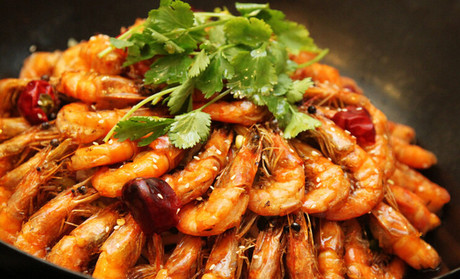Smells good!
好香!
The flavour Zhou Saiqun is talking about is the burnt flavour released in frying.
周賽群說的這種這香正是油炸彰顯出的焦香。
Although more and more theories and tests are showing us the bad influence of overtaking oil and fat,
今天,無論再多理論申明油脂過量的危害,
the Chinese still cannot do without the crisp taste of fried food, just as people in Hunan cannot give up their strong-smelling bean curds.
中國人依然離不開那特有的脆爽口感,就像湖南人對臭豆腐的迷戀。
People are often impressed by the fragrance and hot taste of Hunan dishes.
湖南菜留給外地人的印象主要是“香”和“辣”

However, "hot" is not a term used to describe a flavour, but a strong stimulation brought by chilies to the mouth,
“辣”并不是味道,只是辣椒給口腔造成的強烈刺激,
while the fragrance mainly comes from the oils and fats, and also the chemical reaction between fats and proteins caused by heating.
而“香”則主要來自油脂以及油脂和蛋白質被熱力催生出的化學反應。
Ancient Chinese found that oil could speed up the heating of food.
中國古人用油脂來對食材迅速加熱。
It is undoubtedly a good idea to save fuels.
無疑是節省燃料的好方法。
The introduction of oil into cooking is one great contribution from the Chinese.
油脂的運用是中國人對烹飪的莫大貢獻。
This is Zhou Saiqun's kitchen.
這就是周賽群的廚房。
Okay, the tail is ready now.
好,可以了,看,尾部。
If you are eager to make artistic dishes, but lack a gift for the arts, you may practice by imitating.
想要賦予菜品可觀的賣相如果沒有更多的美術天分就只有靠臨摹。
Nevertheless, cooking skills cannot be mastered by watching only.
盡管如此,做菜是不可能看會的。
The course the Zhou is teaching now only lasts for two years.
這個班只有兩年。
She must show her students as many of the popular dishes in today's restaurants as possible.
周賽群必須盡快把更多的市面流行菜品教給學生。
Therefore, her lessons are not limited to the Hunan Cuisine.
因此教授內容并不拘泥于湘菜。











